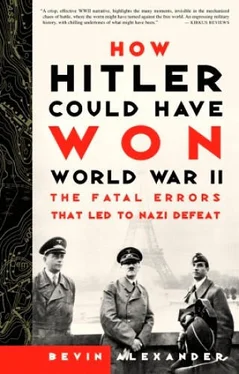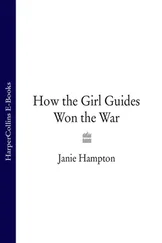Bevin Alexander
HOW HITLER COULD HAVE WON WORLD WAR II
The Fatal Errors That Led to Nazi Defeat
AROUND 400 B.C. THE GREAT CHINESE STRATEGIST SUN TZU BRUSHED IN THE characters for the most profound sentence ever written about warfare: “The way to avoid what is strong is to strike what is weak.”
Adolf Hitler knew nothing of Sun Tzu. But for the first seven years of his dictatorship of Germany, from 1933 to 1940, he avoided strength, struck at weakness, and achieved such stunning success that he was on the threshold of complete victory.
After 1940, however, Hitler abandoned a course of action that would have completed his victory. He attacked frontally into the strength of the Soviet Union, allowed Britain and the United States time to build immense military power, and was unable to prevent them from striking into Germany’s weakness. The collision of the Allies and Germans brought on the most titanic clash in history. But the outcome had already been foreshadowed by Hitler’s fatal mistakes in 1940 and thereafter. By 1945 Germany was shattered and Adolf Hitler dead.
Hitler was one of the most evil monsters the world has ever known. But he was also a skilled politician. His political mastery boosted him into power and allowed him to hide his wickedness behind great economic, territorial, and military advances that he gained for Germany. Hitler did not seek rational goals, however. His aims were those of a maniac. He believed he could elevate the German people into a “master race” through restriction of marriages and sexual relations only among “Aryans,” refusing to recognize that Europeans had been interbreeding for a millennium and there could be no such thing as a pure “race” of Aryans or anything else. He wanted to gain Lebensraum, or living space, for the German people in Russia and Ukraine, and intended to kill or starve millions of Slavs living in those lands. Beyond this Hitler wanted to kill whole categories of people—Jews, Gypsies, persons with mental and physical disabilities, and anyone who objected to his desires.
Hitler possessed great skill in spotting and exploiting the vulnerabilities of opponents. Using these gifts, Hitler gained an unparalleled string of victories that commenced with his installation as German chancellor in January 1933 and ended in the summer of 1940, when his victory over France convinced him he was an infallible military genius. He did not see that the victory came not from his own vision, but from that of two generals, Erich von Manstein and Heinz Guderian.
Believing Britain would no longer be a major problem, Hitler turned his attention to killing Jews and other peoples he despised, and to the destruction of the Soviet Union.
From this point on, these twin drives—war against Soviet Russia and perpetration of the Final Solution—consumed most of Hitler’s attention and the vast bulk of the resources and manpower of the German Reich.
This course led straight to his destruction. It did not have to be. Hitler’s strategy through mid-1940 was almost flawless. He isolated and absorbed state after state in Europe, gained the Soviet Union as a willing ally, destroyed France’s military power, threw the British off the Continent, and was left with only weak and vulnerable obstacles to an empire covering most of Europe, North Africa, and the Middle East. This empire not only would have been unassailable from the outside, but would have put him into the position, in time, to conquer the world.
This did not happen. Hitler’s paranoias overwhelmed his political sense. He abandoned the successful indirect strategy of attacking weakness, which he had followed up to the summer of 1940, and tried to grab Lebensraum directly and by main strength. He was unable to see that he could achieve these goals far more easily and with absolute certainty by in-direction—by striking not what was strong but what was weak.
Even after Hitler invaded the Soviet Union in June 1941, he might have gained a partial victory if he had not possessed two more lethal defects— insistence on offensive solutions to military problems when his strength was inadequate, and attempting to keep all the territory he had seized when retreat would have preserved his forces. These failings led to disastrous offensives—Stalingrad, Tunisia, Kursk, the Bulge—and “no retreat” orders that destroyed huge portions of his army.
The way to victory was not through a frontal attack on the Soviet Union but an indirect approach through North Africa. This route was so obvious that all the British leaders saw it, as did a number of the German leaders, including Alfred Jodl, chief of operations of the armed forces; Erich Raeder, commander of the German Navy, and Erwin Rommel, destined to gain fame in North Africa as the Desert Fox.
After the destruction of France’s military power in 1940, Britain was left with only a single armored division to protect Egypt and the Suez Canal. Germany had twenty armored divisions, none being used. If the Axis— Germany and its ally Italy—had used only four of these divisions to seize the Suez Canal, the British Royal Navy would have been compelled to abandon the Mediterranean Sea, turning it into an Axis lake. French North Africa—Morocco, Algeria, and Tunisia—could have been occupied, and German forces could have seized Dakar in Senegal on the west coast of Africa, from which submarines and aircraft could have dominated the main South Atlantic sea routes.
With no hope of aid, Yugoslavia and Greece would have been forced to come to terms. Since Hitler gained the support of Hungary, Romania, and Bulgaria, Germany would have achieved control of all southeastern Europe without committing a single German soldier.
Once the Suez Canal was taken, the way would have been open to German armored columns to overrun Palestine, Transjordan, the Arabian peninsula, Syria, Iraq, and Iran. This would have given Germany unlimited supplies of the single commodity it needed most: oil.
As important as oil was for the conduct of modern war, the greatest advantages of German occupation of the Arab lands and Iran would have been to isolate Turkey, threaten British control of India, and place German tanks and guns within striking distance of Soviet oil fields in the Caucasus and along the shores of the Caspian Sea. Turkey would have been forced to become an ally or grant transit rights to German forces, Britain would have had to exert all its strength to protect India, and the Soviet Union would have gone to any lengths to preserve peace with Germany because of its perilous position.
Germany need not have launched a U-boat or air war against British shipping and cities, because British participation in the war would have become increasingly irrelevant. Britain could never have built enough military power to invade the Continent alone.
Unless the strength of the Soviet Union were added, the United States could not have projected sufficient military force across the Atlantic Ocean, even over a period of years, to reconquer Europe by amphibious invasion in the face of an untouched German war machine. Since the United States was increasingly preoccupied with the threat of Japan, it almost certainly would not have challenged Germany.
Thus, Germany would have been left with a virtually invincible empire and the leisure to develop defenses and resources that, in time, would permit it to match the strength of the United States. Though Britain might have refused to make peace, a de facto cease-fire would have ensued. The United States would have concentrated on defense of the Western Hemisphere and the Pacific. Even if the United States had proceeded with development of the atomic bomb, it would have hesitated to unleash it against Germany.
Читать дальше




![Джонатан Димблби - Barbarossa - How Hitler Lost the War [calibre]](/books/385421/dzhonatan-dimblbi-barbarossa-how-hitler-lost-the-w-thumb.webp)









